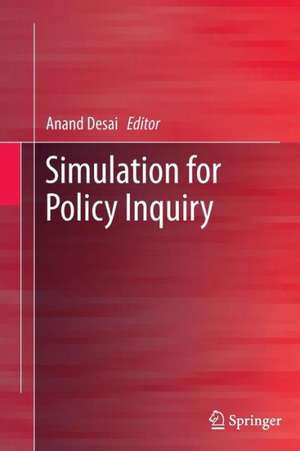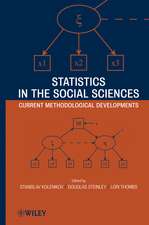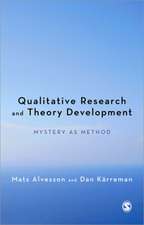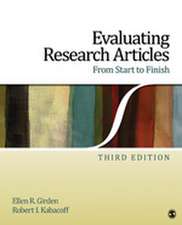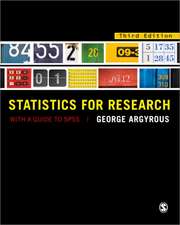Simulation for Policy Inquiry
Editat de Anand Desaien Limba Engleză Paperback – 11 iun 2014
Simulation models have long existed at the fringes of policy inquiry but are not yet considered an essential component of the policy analyst’s toolkit. However, this situation is likely to change because with improvements in computational power and software, simulation is now easier to include in the standard repertoire of research tools available for discovery and decision support. This volume provides both a conceptual rationale for using simulations to inform public policy and a practical introduction to how such models might be constructed and employed. The focus of these papers is on the uses of simulation to gain understanding and inform policy decisions and action. Techniques represented in this volume include Monte Carlo simulation, system dynamics and agent based modeling.
| Toate formatele și edițiile | Preț | Express |
|---|---|---|
| Paperback (1) | 638.11 lei 6-8 săpt. | |
| Springer – 11 iun 2014 | 638.11 lei 6-8 săpt. | |
| Hardback (1) | 643.34 lei 6-8 săpt. | |
| Springer – 23 mai 2012 | 643.34 lei 6-8 săpt. |
Preț: 638.11 lei
Preț vechi: 750.72 lei
-15% Nou
Puncte Express: 957
Preț estimativ în valută:
122.12€ • 127.16$ • 103.21£
122.12€ • 127.16$ • 103.21£
Carte tipărită la comandă
Livrare economică 07-21 martie
Preluare comenzi: 021 569.72.76
Specificații
ISBN-13: 9781493901005
ISBN-10: 1493901001
Pagini: 248
Ilustrații: XVI, 232 p.
Dimensiuni: 155 x 235 x 13 mm
Greutate: 0.35 kg
Ediția:2012
Editura: Springer
Colecția Springer
Locul publicării:New York, NY, United States
ISBN-10: 1493901001
Pagini: 248
Ilustrații: XVI, 232 p.
Dimensiuni: 155 x 235 x 13 mm
Greutate: 0.35 kg
Ediția:2012
Editura: Springer
Colecția Springer
Locul publicării:New York, NY, United States
Public țintă
ResearchCuprins
PART I.- 1.Simulation Design for Policy Audiences: Informing Decision in the Face of Uncertainty.- 2.Using Simulation as a Scenario Builder for Decision Making – A Case Study Using the Nurse-Family Partnership Program in Louisiana.- 3.The Utility of Multilevel Modeling vs. Agent-Based Modeling in Examining Spatial Disparities in Diet and Health: The Case of Food Deserts.- PART II.- 4.Urban Renaissance or Invasion: Planning the Development of a Simulation Model of Gentrification.- 5.Simulating Life Cycle Costs for Nuclear Facilities.- 6.Simulating a Fraud Mechanism in Public Service Delivery.- 7. Exploring Assumptions through Possible Worlds: The Case of Homeownership.- PART III.- 8.Simulating the Multiple Impacts of Deferred Maintenance.- 9.Pandemic Influenza Simulation with Public Avoidance Behavior.- 10.Iterative Storytelling in Public Policy: A Systems Thinking Approach Hightower.
Textul de pe ultima copertă
Public policy and management problems have been described as poorly defined, messy, squishy, unstructured, intractable, and wicked. In a word, they are complex. This book illustrates the development and use of simulation models designed to capture some of the complexity inherent in the formulation, management, and implementation of policies aimed at addressing such problems.
Simulation models have long existed at the fringes of policy inquiry but are not yet considered an essential component of the policy analyst’s toolkit. However, this situation is likely to change because with improvements in computational power and software, simulation is now easier to include in the standard repertoire of research tools available for discovery and decision support. This volume provides both a conceptual rationale for using simulations to inform public policy and a practical introduction to how such models might be constructed and employed. The focus of these papers is on the uses of simulation to gain understanding and inform policy decisions and action. Techniques represented in this volume include Monte Carlo simulation, system dynamics and agent based modeling.
Simulation models have long existed at the fringes of policy inquiry but are not yet considered an essential component of the policy analyst’s toolkit. However, this situation is likely to change because with improvements in computational power and software, simulation is now easier to include in the standard repertoire of research tools available for discovery and decision support. This volume provides both a conceptual rationale for using simulations to inform public policy and a practical introduction to how such models might be constructed and employed. The focus of these papers is on the uses of simulation to gain understanding and inform policy decisions and action. Techniques represented in this volume include Monte Carlo simulation, system dynamics and agent based modeling.
Caracteristici
Organized as a coherent whole to introduce simulation as a learning tool that can be used to understand and explore complex systems and to inform decisions Contains authored papers by scholars working in various policy including policy informatics, public policy and management, public administration, and simulation Uses examples that are readily accessible to those who are simply exploring the uses of simulation and also offers sufficient substantive and technical detail to be of interest to established users of simulations
